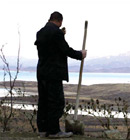Society
Chinglish booklet stirs debate ahead of Expo
By Liu Wei (China Daily)
Updated: 2010-01-21 07:49
 |
Large Medium Small |
A bilingual reading card that aims to help the Chinese learn simple English words and phrases ahead of the Shanghai World Expo, which begins May 1, has sparked debate in the city.
The "Bilingual Instruction of Luwan District for Expo" has listed some English terms and phrases, which are important in everyday use, alongside Chinese characters that may not mean anything but definitely sound like English.
| |||||||
Several Shanghai residents said they were shocked when they got their hands on the reading card, adding that it was an unscientific way of learning a foreign language at best.
But there were others who thought the instructions are suitable for the elderly, who are only interested in learning a few English words.
"I don't think it's inappropriate," said a Fudan University student surnamed Lian. "On the contrary, the method is quite popular among the foreigners who are studying Chinese. Even they memorize the Chinese sentence 'da hui lang kan jian xiao bai tu (timber wolf saw a rabbit)' as 'dolphin long can Jim shall by too low'. So it can work both ways."
Zhi Linglin, a journalist with the Shanghai-based Jiefang Daily, also praised the idea.
"If we have a group of friendly grandmas and grandpas saying 'gu de mao ning' to foreign visitors, it would be lovely, and very beneficial for promoting Shanghai's image to the world," she said.
Yang Xiong, the deputy managing director of the executive board of the Shanghai Expo, said authorities were searching for translation errors in public areas.












